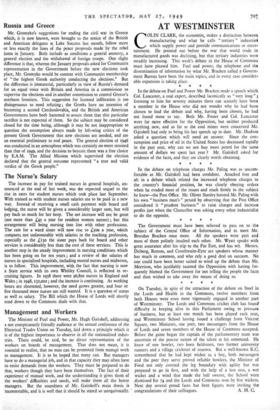Russia and Greece
Mr. Gromyko's suggestions for ending the civil war in Greece which, it is now known, were brought to the notice of the British and American delegates at Lake Success last month, follow more or less exactly the lines of the peace proposals made by the rebel junta in January. Both include as conditions a general amnesty, a general election and the withdrawal of foreign troops. One slight difference is that, whereas the January proposals asked for Communist representation in the Government before the new elections took place, Mr. Gromyko would be content with Communist membership of " the highest Greek authority conducting the elections." But the difference is immaterial, particularly in view of Russia's demand for an equal voice with Britain and America in a commission to supervise the elections and in another commission to control Greece's northern frontiers. This suggestion for licensed infiltration is too disingenuous to need refuting ; the Greeks have no intention of becoming a second Czechoslovakia, and the British and American Governments have both hastened to assure them that this particular sacrifice is not expected of them. So the subject may be considered closed for the time being, although it may be not inappropriate to question the assumption always made by left-wing critics of the present Greek Government that new elections are needed, and are an essential preliminary to real peace. The general election of 1946 was conducted in an atmosphere which was certainly no more strained than that of 1949, and the decision to boycott them was a free choice by EA.M. The Allied Mission which supervised the election declared that the general outcome represented "a true and valid verdict of the Greek people."






































 Previous page
Previous page